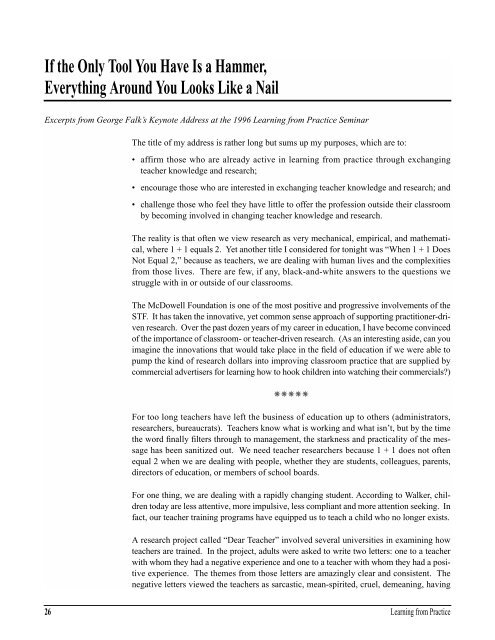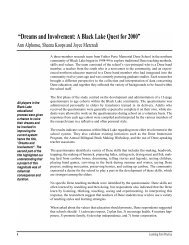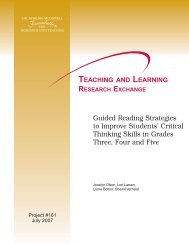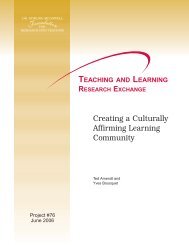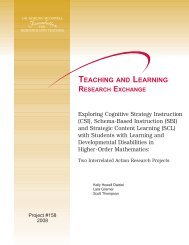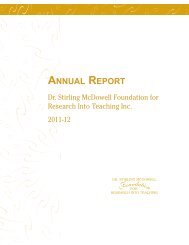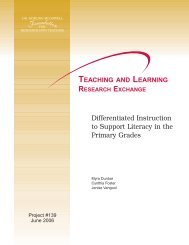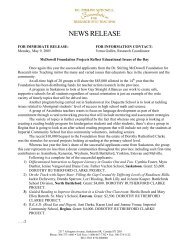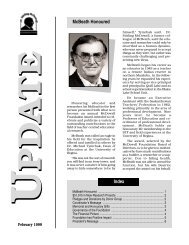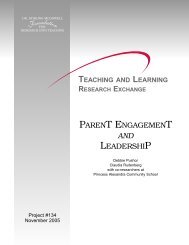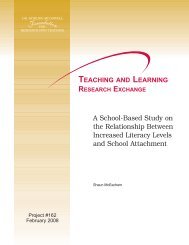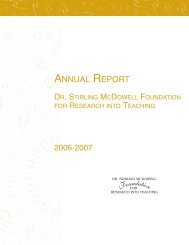Research Bulletin, Vol. 1, No. 2, 1996 - Dr. Stirling McDowell ...
Research Bulletin, Vol. 1, No. 2, 1996 - Dr. Stirling McDowell ...
Research Bulletin, Vol. 1, No. 2, 1996 - Dr. Stirling McDowell ...
Create successful ePaper yourself
Turn your PDF publications into a flip-book with our unique Google optimized e-Paper software.
If the Only Tool You Have Is a Hammer,Everything Around You Looks Like a NailExcerpts from George Falk’s Keynote Address at the <strong>1996</strong> Learning from Practice SeminarThe title of my address is rather long but sums up my purposes, which are to:• affirm those who are already active in learning from practice through exchangingteacher knowledge and research;• encourage those who are interested in exchanging teacher knowledge and research; and• challenge those who feel they have little to offer the profession outside their classroomby becoming involved in changing teacher knowledge and research.The reality is that often we view research as very mechanical, empirical, and mathematical,where 1 + 1 equals 2. Yet another title I considered for tonight was “When 1 + 1 Does<strong>No</strong>t Equal 2,” because as teachers, we are dealing with human lives and the complexitiesfrom those lives. There are few, if any, black-and-white answers to the questions westruggle with in or outside of our classrooms.The <strong>McDowell</strong> Foundation is one of the most positive and progressive involvements of theSTF. It has taken the innovative, yet common sense approach of supporting practitioner-drivenresearch. Over the past dozen years of my career in education, I have become convincedof the importance of classroom- or teacher-driven research. (As an interesting aside, can youimagine the innovations that would take place in the field of education if we were able topump the kind of research dollars into improving classroom practice that are supplied bycommercial advertisers for learning how to hook children into watching their commercials?)✵✵✵✵✵For too long teachers have left the business of education up to others (administrators,researchers, bureaucrats). Teachers know what is working and what isn’t, but by the timethe word finally filters through to management, the starkness and practicality of the messagehas been sanitized out. We need teacher researchers because 1 + 1 does not oftenequal 2 when we are dealing with people, whether they are students, colleagues, parents,directors of education, or members of school boards.For one thing, we are dealing with a rapidly changing student. According to Walker, childrentoday are less attentive, more impulsive, less compliant and more attention seeking. Infact, our teacher training programs have equipped us to teach a child who no longer exists.A research project called “Dear Teacher” involved several universities in examining howteachers are trained. In the project, adults were asked to write two letters: one to a teacherwith whom they had a negative experience and one to a teacher with whom they had a positiveexperience. The themes from those letters are amazingly clear and consistent. Thenegative letters viewed the teachers as sarcastic, mean-spirited, cruel, demeaning, having26Learning from Practice


